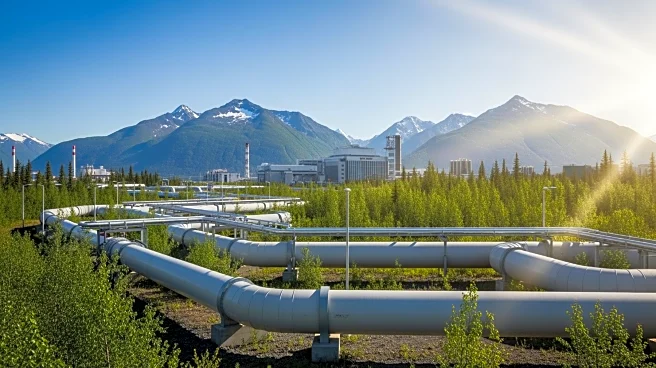What's Happening?
Baker Hughes has entered into a definitive agreement with Glenfarne Alaska LNG, LLC, a subsidiary of Glenfarne Energy Transition, to advance the development of the Alaska LNG Project. This initiative is a significant U.S. liquefied natural gas project
aimed at bolstering American energy security and enhancing global competitiveness. Baker Hughes will supply the main refrigerant compressors for the LNG terminal and power generation equipment for the North Slope gas treatment plant. The announcement was made in Washington, D.C., with U.S. Secretary of the Interior Doug Burgum and U.S. Secretary of Energy Chris Wright present, highlighting the administration's support for expanding domestic LNG infrastructure. The project is being developed in two phases, with Phase One involving an 807-mile pipeline to transport natural gas from Alaska's North Slope to meet in-state energy needs. Phase Two will add an LNG export terminal with a capacity of 20 million tonnes per annum, targeting a final investment decision in late 2026.
Why It's Important?
The partnership between Baker Hughes and Glenfarne Alaska LNG is crucial for U.S. energy independence and international energy leadership. By enhancing LNG infrastructure, the U.S. aims to secure affordable and reliable energy sources, which are vital for economic stability and growth. The project is expected to attract global partners, thereby increasing the U.S.'s influence in the global energy market. Additionally, the development of the Alaska LNG project supports the transition to lower-carbon natural gas, aligning with environmental goals while meeting energy demands. The strategic investment by Baker Hughes underscores the momentum of the project and its potential to fulfill national and state energy objectives.
What's Next?
The next steps for the Alaska LNG project include completing the final cost analysis for Phase One by December, ahead of a final investment decision. Glenfarne has already secured preliminary commercial commitments for over 60% of the planned capacity, with agreements from Tokyo Gas, JERA Co. Inc., and POSCO International Corporation. As the project progresses, stakeholders will likely focus on securing additional commercial commitments and finalizing investment decisions for Phase Two. The Trump administration's support suggests continued governmental backing, which may influence future policy decisions related to energy infrastructure and security.
Beyond the Headlines
The development of the Alaska LNG project could have long-term implications for U.S. energy policy and international relations. By increasing LNG exports, the U.S. may strengthen its geopolitical position, particularly in energy-dependent regions. The project also highlights the ongoing shift towards natural gas as a transitional energy source, balancing environmental concerns with energy needs. Furthermore, the collaboration between U.S. companies and international partners may foster technological advancements and innovation in LNG production and distribution.















